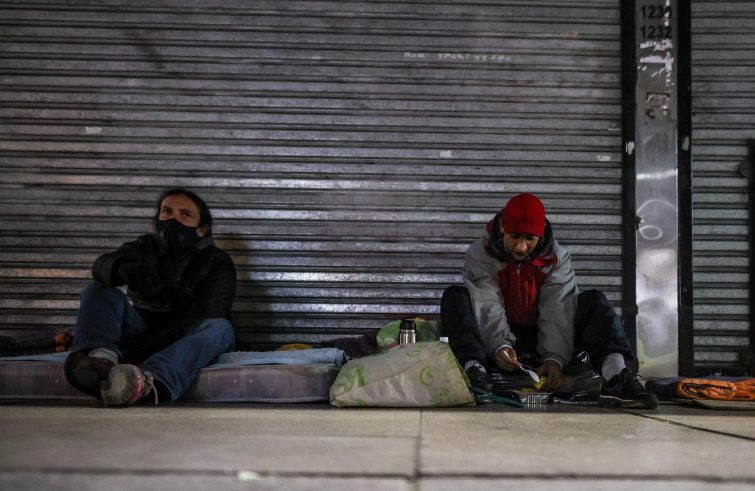
Every night more than 700,000 people are sleeping rough in Europe – on platforms and benches, in doorways and in train stations. This number has risen by 70% in the last 10 years. Several factors account for this “most extreme form of social exclusion”, as defined by European Commissioner Nicholas Schimdt during the recent launch of the European Platform for Combating Homelessness. Many actions are needed to tackle the problem: youth policies, income, social housing, social security, labour law and integration. The EU platform has three objectives: to share experiences for mutual learning of good practices; to make best use existing financial resources, both those provided by the “Recovery and Resilience Facility”, as well as the resources available under the European Social Fund Plus and the European Regional Development Fund; to improve the collection of data and evidence to inform decisions and create synergies. The goal: eliminating homelessness by 2030 in the EU, said Commissioner Schmidt. Uves Leterme (Belgium) will chair the platform, coordinating cooperation among the various stakeholders (EU institutions, Member States, regional and local authorities, civil society organisations). High-level conferences will be convened every two years by the EU rotating presidencies to monitor the implementation of the principles of the Lisbon Declaration on Combating Homelessness
Root causes. The document, signed by the three European institutions and all 27 EU Member States, states that
the root causes of homelessness include “rising housing costs, insufficient supply of social housing stock or housing assistance, low income and precarious jobs, job loss, ageing and family breakdown, discrimination, long-term health problems”
along with insufficiently prepared release from institutional settings, such as prisons. Safe and affordable housing is a key challenge, as reported by the former homeless speaking in Lisbon on 21 June to share successful stories of a new start, all linked to housing. Elda Jesus Coimbra is one of them: “I left my previous life in the streets, she said, “when I was given a set of keys and told that they would open the door to my home.” But housing is increasingly becoming a luxury good: rents account for 40% of tenants’ salaries, it was said in Lisbon.
A specific responsibility for each signatory. The Declaration sets out in writing the spheres of action of each of the signatories. The European Commission will support “monitoring of homelessness”, with a view to provide “a quantitative and qualitative assessment of progress made”; “mutual learning of good practices”, and promote the use of EU funding to support inclusive policy measures.
The European Parliament, for its part, pledged to “promote and support policies for reducing poverty, notably among children, and ending homelessness in Europe by 2030,
including through the action plan of the European pillar of social rights. National, regional and local authorities are required to “promote initiatives for the prevention of homelessness”, notably “access to permanent housing and the provision of enabling support services to the homeless. The Declaration was also signed by EU level civil society organisations and social partners, pledging, inter alia, to facilitate mutual learning” and learn from the most successful experiences.
Three positive experiences. These are many, including three awarded in Lisbon by the European Federation of National Organisations Working with the Homeless (FEANTSA).
The Housing First project, run by Fondazione Diocesana Caritas Trieste Onlus since 2019, has provided ten flats for a total of thirty people, including five families, integrated in a support programme aimed at housing autonomy.
The award also went to a project by the Romodrom NGO from the Czech Republic, operating in response to the housing emergency for the Roma population. A total of 21 families have been supported in the past few years in successful integration paths, firstly by being granted access to housing. The third award-winning project is run by the Portuguese Crescer network: in Carnide, in the Bairro Padre Cruz, a socially disadvantaged neighbourhood, was recently opened a restaurant, “É uma mesa”, employing homeless people. The project, named “assisted employment”, aims to integrate 75 people annually into vocational training courses with a view to reintegrating them into the job market and enabling them, with a salary, to pay a rent and thus averting homelessness.
The situation in Italy. The situation in Italy is not as clearly defined: the latest data on homelessness date back to 2014, when the second report on the plight of people in extreme poverty was released, showing a total of 50,724 homeless people. Three years earlier they numbered 47,648. Seven years have passed and a pandemic has dramatically impacted the most vulnerable groups. The national recovery and relaunch plan, has earmarked €450 million for “temporary housing and shelters”, as evidenced recently by Minister Andrea Orlando. But these are not adequate measures, wrote the Italian Federation of Organisations for the Homeless (Fio.psd), which brings together 140 organisations, associations, social cooperatives and local authorities, in a letter to Minister Orlando. “Temporary housing” is not enough. It is necessary to give these people “all the time they need” to get back on their feet, including “vocational training, social and health integration, job placement and income increase.” According to Fio.psd, it is necessary to rethink the “shelter stations”, i.e. the night shelters in Italian cities:
“We hope that the services planned will serve as multipurpose centres with 24-hour access, for integrated care and for participatory support programmes.”
Fio.psd proposes the creation of “micro hostels with no more than 30 beds, with premises open to the general public, facilitating integrated social and health care initiatives and coordination with multidisciplinary units.” The letter further suggests that all these activities should not be solely the responsibility of charities.











